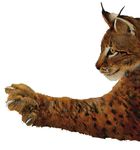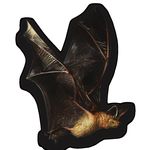NIGHT CREATURES Animals That Swoop, Crawl, and Creep while You Sleep 978-1-5415-8129-6 Rebecca E. Hirsch
←
→
Page content transcription
If your browser does not render page correctly, please read the page content below
NIGHT CREATURES Animals That Swoop, Crawl, and Creep while You Sleep 978-1-5415-8129-6 Rebecca E. Hirsch This guide was created by Rebecca E. Hirsch. © 2021 Lerner Publishing Group Illustrations © 2021 by Sonia Possentini. All rights reserved. This page may be reproduced for free distribution for educational purposes.
NIGHT CREATURES
by Rebecca E. Hirsch
Explore the Night
Are you looking for a memorable activity to do with
kids? Try exploring the outdoor world at night.
Nighttime gives you a new perspective on the
natural world. Different animals are awake.
Different smells and sounds are present. Because
your vision is limited, your other senses will be
heightened. Night forces you to slow down and
listen. Exploring the night can be a wonderful
adventure, filled with excitement and discovery.
This guide was created by Rebecca E. Hirsch.
© 2021 Lerner Publishing Group
Illustrations © 2021 by Sonia Possentini. All rights reserved. This page may be
reproduced for free distribution for educational purposes.Plan a Night Hike
A fun way to get to know the night is with a night hike. A night hike requires a little planning to be done safely.
Choose a safe place to explore that’s as dark as possible. Try a natural area, park, or secluded backyard away
from a large city and out of the direct lights of buildings and street lamps. Walk through the area during the
day to get to know it better and select a safe route. Look out for potential hazards on your route.
Bring a flashlight, but try to avoid using it except in case of an emergency or to read a map. Cover the lit end
of the flashlight with red cellophane or a red sock so the light comes out red in color. Red light won’t ruin your
eyes’ adjustment to the dark, and many night creatures do not see red light and so they will not be disturbed
by it.
Be sure to dress warmly for your nighttime adventure. Night air can be chilly, even in summer. You can even
pack some hot chocolate to enjoy after your adventure.
MATERIALS:
• Flashlight covered with red cellophane or a red sock
• Worry stones (smooth pebbles)
OPTIONAL MATERIALS:
• Rope
• Scent canisters (small container with pine cones or mint leaves)
• Magic sniffing potion (bottle of water)
• A bag of textured material such as pine cones, shells, pebbles,
pine needles, feathers, etc.
• Small pieces of scrap paper
• A bag of unwrapped crayons
• Hot chocolate
Afraid of the Dark?
If a child is afraid, talk ahead of time about their fears before exploring the dark. What makes night different
than day? Why does the dark feel scary? Most people aren’t really afraid of the dark. They’re afraid of what they
can’t see that they imagine might be hidden in the dark.
One way to soothe an anxious child is to bring along a smooth pebble, called a worry stone. If a child is worried
about the dark, place the pebble in their hand. Explain that they can put the pebble in their pocket and when
they rub it, their worries will go into the stone. Assure them that stones are tough and can take it.
You can make nervous night hikers feel safer by leading them single file while holding onto a rope with
everyone spaced a few feet apart.
Alternatively, you can experience the wonders of the night and do the activities while sitting in one place or
lying on a blanket.
Enter the Dark Gradually
Your eyes will wake up at night, but you need to give them a little time. Give your eyes at least 10 minutes,
and preferably 20 minutes, to adjust to the dark. Try sitting or standing in one place while your eyes adjust.
Encourage everyone to be quiet and listen for night sounds so as not to scare away any animals. If you need to
talk, speak quietly, using your “night voice.” This can be a good time to try one of the activities, like Deer Ears or
What Is It?
Once your eyes adjust to the dark, you may be surprised at how much light you can see. Light may be coming
from the stars and moon, especially if there is a full moon. Light may be coming from glowing animals, like
fireflies. In a forest, light may even come from glowing mushrooms!
This guide was created by Rebecca E. Hirsch.
© 2021 Lerner Publishing Group
Illustrations © 2021 by Sonia Possentini. All rights reserved. This page may be
reproduced for free distribution for educational purposes.Time for a Night Hike
When it’s time for your night hike, walk as silently as possible so you can hear the sounds of
night. Keep all your senses open and alert.
As you walk, feel the ground with your feet. Even if you can’t see where you are going, your
feet will be able to feel the difference between the compacted ground of a hard path and the
softer, squishier ground just off the path. If you encounter an obstacle, like a tree root or a
bend in the trail, tell the next person behind you and ask them to pass it along. That way no
one will be surprised by what is coming.
As you walk, smell the air. Does it smell different than in the daytime?
Look at tree silhouettes against the night sky. Can you identify trees based on their shape alone?
You may feel temperature changes. Are some areas cooler? Why do you think that is?
Watch for evidence of night creatures (see Signs of Night Creatures). Listen for their calls.
Depending on the time of year, you may hear the breathy snort of a deer, the hoot of an owl,
the bellows or chirps of frogs, or the calls of crickets and katydids.
It’s a good idea to pause along your route. Practice being still, quiet, and alert. Animals
may no longer realize you are there and begin to act normally. There is no telling what may
suddenly appear!
A pause along the route is a good chance to try one or more of the games and activities on the
next page.
This guide was created by Rebecca E. Hirsch.
© 2021 Lerner Publishing Group
Illustrations © 2021 by Sonia Possentini. All rights reserved. This page may be
reproduced for free distribution for educational purposes.Games and Activities
What Is it?
For this game, you’ll need to bring along a bag of textured objects, such as feathers (even a bit of down
from a down jacket can work), a pebble, pine needles, a pine cone, a shell, etc. Ask a child to hold the
item in their open hand with their eyes closed. Can they identify the object by touch alone?
What Color Is It?
Can your eyes see color at night? To find out, give everyone a piece of white scrap paper and an
unwrapped crayon. Ask them to draw a night creature on one side of the paper. On the other side, have
them write what color crayon they think they have. Return the crayons to the bag. Have everyone put
their drawing in their pocket.
At the end of the walk, when everyone is back in the light, each person can see if the color they
wrote matches the color of the drawing. Don’t be surprised if it doesn’t. Even though we can see at
night, we are “color blind.” This is because our eyes have two types of light receptors, rods and cones.
Cones see color, but they need a lot of light to work. At night, we rely on our rods to see, but they do
not sense color.
Deer Ears
Deer have large ears that catch and funnel sound. A deer can swivel its ears to hear sounds coming
from different directions.
You can make your own deer ears by cupping both hands behind your ears. This funnels sounds to
your ears, just like a deer’s ears. Try on your deer ears, then drop your hands and compare. You’ll hear
sounds much better with your deer ears.
With your deer ears on, be quiet, rotate in a circle, and listen. You should be able to hear things you
didn’t before. Try aiming your deer ears in different directions. Can you use them to pinpoint where
sounds are coming from?
Magic Sniffing Potion
Many animals have a strong sense of smell. Animals such as
deer and dogs have wet noses that hold onto scent molecules,
making them excellent odor detectors.
Pass around a small container filled with a scented object
(garlic, pine needles, mint leaves, etc.). Have everyone smell the
object. Next, have each person wet their nose using a few drops
from a water bottle squirted onto their fingers. Again, pass
around the scented object. Can they smell it better with a dry
nose or a wet nose?
This guide was created by Rebecca E. Hirsch.
© 2021 Lerner Publishing Group
Illustrations © 2021 by Sonia Possentini. All rights reserved. This page may be
reproduced for free distribution for educational purposes.Signs of Night Creatures
Many animals are nocturnal (active only at night) or crepuscular (active only at dusk or
dawn). You can learn to identify these creatures even if you can’t see them clearly.
IF YOU SEE… IT’S PROBABLY… WHAT TO DO
Flashes of light Fireflies If the night isn’t completely dark, you
may be able to catch a firefly in your
cupped hands. Then open your hands.
The beetle may crawl on your palm and
give a flash before flying away.
Gleaming spots of light in pairs The eyes of a night creature, such as Shine your red-covered flashlight to try
a raccoon or bobcat, reflecting off the to see whose eyes they are.
moon or your flashlight
Flash of a white tail A cottontail (low to the ground) or deer Stay still and watch closely.
(higher off the ground)
Darting, zigzag movements in the air A bat Stay still and watch.
Darting movements through grass A mouse or other small creature Sit still and watch to see if you can
identify the creature.
Quiet gliding wings attached to a An owl Stay still and watch.
feathery body
Black-and-white streaks or spots moving A skunk Stay still and watch, getting no closer
close to the ground than about fifteen feet (4.5 meters).
Night Reflections
After your nighttime adventure, you can sit in a comfortable spot outdoors, either in the dark or around a
campfire. Invite children to talk about what they experienced. Children can complete prompts like:
The night makes me feel…
I felt scared when…
The night looks like…
The night sounds like…
The night smells like…
The night feels like…
My favorite night creature is… because…
Acknowledgements
Special thanks to Doug Wentzel, Program Director at Shaver’s Creek Environmental Center in Petersburg, Pennsylvania, for sharing
his valuable insights on night walks with me. Other sources I consulted include:
Bosak, Susan. Science Is… 2nd Edition. Ontario: Scholastic Canada, 1991.
Brown, Vinson. Knowing the Outdoors in the Dark. New York: Collier Books, 1972.
“Night Hike.” Upham Woods Outdoor Learning Center, University of Wisconsin-Extension.
https://fyi.extension.wisc.edu/uphamwoods/files/2019/05/Night-Hike-Lesson-Plan.pdf
This guide was created by Rebecca E. Hirsch.
© 2021 Lerner Publishing Group
Illustrations © 2021 by Sonia Possentini. All rights reserved. This page may be
reproduced for free distribution for educational purposes.NIGHT
CREATURES
Animals That Swoop, Crawl,
and Creep while You Sleep
Hardcover: 978-1-5415-8129-6
$19.99 (List) • $14.99 (S&L)
eBook: 978-1-7284-3092-8
Grades K-4 • Ages 5-10
REBECCA E. HIRSCH is the author of more
than eighty children’s science and nature books, including
Plants Can’t Sit Still, an NCTE Notable Children’s Book in
the Language Arts. Her love of night creatures can be
traced back to her childhood in the western Pennsylvania
countryside, where she spent summer nights chasing
fireflies, watching the stars come out, and listening to
frogs sing. She holds a doctorate in the life sciences and
makes her home in central Pennsylvania. Find out more at
rebeccahirsch.com.
This guide was created by Rebecca E. Hirsch.
© 2021 Lerner Publishing Group
Illustrations © 2021 by Sonia Possentini. All rights reserved. This page may be
reproduced for free distribution for educational purposes.You can also read



























































